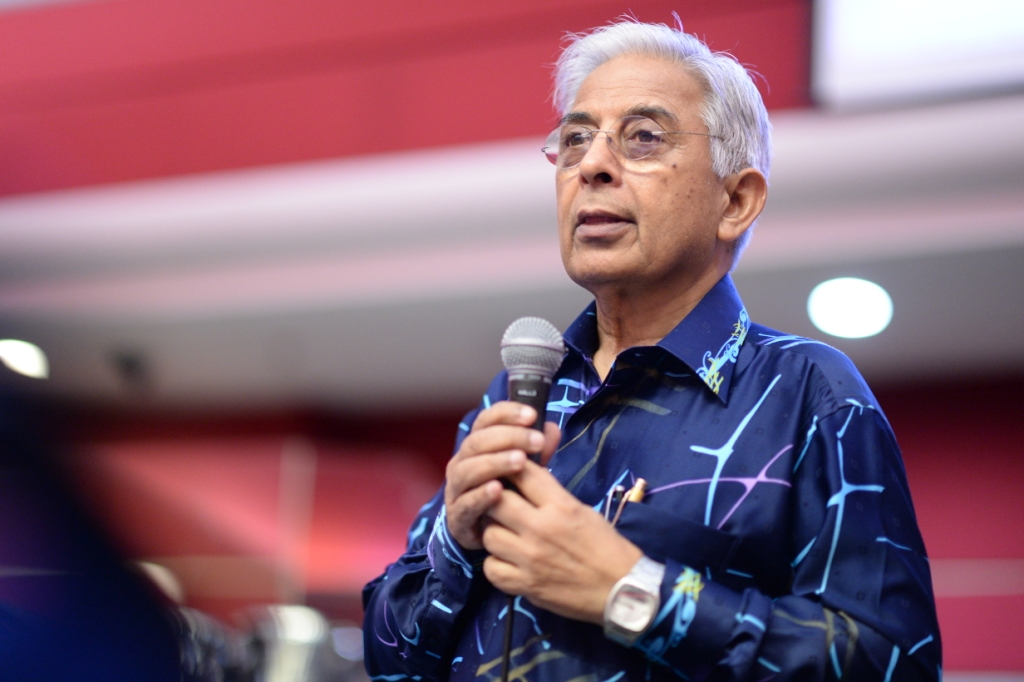
On the surface, the Federal Constitution may seem to have a tenuous connection with spiritual Christianity. Yet the Bible is also full of counsel concerning not only obedience to appointed authorities, but also a proactive engagement within our respective nation. And nothing ties a nation together as much as a shared identity, as typically embodied in a nation’s Constitution.
What are Christians to make of this? As citizens of a nation, we have certain mutual agreement with every part of society, be it fellow civilians, or the government. For every Malaysian, the Federal Constitution is the starting point in understanding our place as citizens within this nation. But for Christians it goes beyond that.

We are called by God to be a positive force in our nation, and in order for this, it is important that we understand the local context in terms of our nation. A part of such a context exists within a social contract and a shared history. We need to be aware of the communities and interests that make up Malaysia as a whole, and as Christians, we need to be in touch with these realities.
It is also one of the keys towards understanding ourselves and our neighbours. Consequent to this, an objective and careful study of the Constitution through the eyes of legal experts is necessary to understand the context we are in for us to relate better with others.

The understanding of the Federal Constitution is fundamental in engaging society because it is a starting point for us as citizens, and a common document that we share with our neighbors. It is the most important document in a nation that unites us all together. If we are determined to love our neighbors, we need to know this common platform we share and also to learn to listen. This is essential to our being salt and light in this land.
Recently, in early November, the Citizens Network for a Better Malaysia (CNBM) hosted and organized a session on our Federal Constitution, guided by constitutional law expert Dr Shad Saleem Faruqi. Dr Faruqi is a Senior Professor of Law and Legal Advisor at Universiti Teknologi MARA, Shah Alam. It is the hope of CNBM that Christians in this nation would work together to build bridges, together as a nation, on aspirations that are shared by many parties.

As an expert on the Federal Constitution and constitutional law in general, Dr Faruqi has authored 9 books and contributed 435 articles to legal periodicals, anthologies and newspapers and has presented over 300 seminar papers in 15 countries.
He also served as a consultant to many countries, even helping to draft the constitution of the Republic of Maldives as part of an Asia Foundation Project in 1991. He holds distinguished membership and positions in numerous organizations and is a judge on the Kuala Lumpur War Crimes Court.
A Basic History of the Federal Constitution
One way for us to understand our characters as citizens is to understand our shared history. Dr Faruqi shared that constitutions are born to mark stages in progression towards self-government, to establish the foundations of a newly independent state, or to start afresh after a revolutionary or ideological upheaval.
In British Malaya, Datuk Onn’s opposition to the Malayan Union proposal of 1946 galvanized Malay nationalism. The multi-racial alliance that was forged to struggle for independence earned a massive victory at the 1955 Election to the Federal Legislative Council, and demands for the removal of the yoke of colonialism was made.
The birth of the Federal Constitution had to go through many complexities, and CNBM attendees were guided through many of the historical events such as the London Conference of 1956, the Reid Commission, and the appointment of the Tripartite Working Party, right up to the ratification of the Constitution.

From the very start, in the very formation of the Reid Commission to draft the Constitution, we could already see that the early leaders were determined that it was to be independent and free from bias and prejudice. The Reid Commission was a compromise that consisted of leaders and experts on Constitutional Law from other nationalities.
Half of the 20-page memorandum that was drawn up for the Reid Commission dealt with communal issues and with the need to cater to Malaya’s dazzling diversity. On most issues the Reid Commission showed deference to the “social contract” negotiated by the communities.
Between June and October 1956, the Commission held 118 public and private hearings and the first groundwork of the Constitution was drafted. It provided for, among other things, a supreme Constitution, an independent judiciary with powers of judicial review, a federal system of government with a heavy central bias, a Westminster style of parliamentary democracy, and a constitutional monarchy at both state and federal levels.

Among other things, it also provided a chapter on partially entrenched fundamental rights, provisions for Parliamentary power during times of emergency, special protection for the rights of Malay rulers, and a continuation of the historical provisions relating to Malay privileges, but with liberal rights of citizenship for all persons born in the Federation including linguistics, culture and religion.
There were consternation with some parts of the Reid Proposal, and a Tripartite Working Party was formed in response. Some “Malay features” of the Constitution were augmented but they were balanced by safeguards for other communities. Dr Faruqi shared that the spirit of the forefathers that animated the Constitution was one of tolerance, compassion, and compromise.
The master plan that was finally adopted bore the mark of idealism and realism, the old and the new, the indigenous and the imported. Among Constitutional ideas that were blended with Malayan traditions were those from the UK, India, Ceylon, Australia and the USA.

The Tripartite Working Party Report had to underwent a lengthy and extraordinary process of ratification of the Merdeka Constitution by the Federal Legislative Council, the Assemblies of the Malay States, the United Kingdom Parliament and the British Crown, and though there was a stormy debate from the 9th-29th of July 1957, the leaders of the Alliance stood firm and united by their negotiated settlement.
At the stroke of midnight on August 31, 1957, at the Stadium Merdeka, the Duke of Gloucester, on behalf of the British Queen, handed over to the Tunku the constitutional documents signifying the independence of the Federation of Malaya.
Significance of National Constitutions
Why is it important that we know our Federal Constitution? Dr Faruqi communicated that Constitutional Law is linked with a nation’s philosophy at one end and its politics at the other. It is silhouetted against the panorama of history, economics and culture. More than other fields of law, it reflects the dreams, demands, values, and vulnerabilities of the body-politic within a nation.
A Constitution is like a political architect’s master-plan for the nation. It is a body of fundamental law that describes the manner in which the state is organized, government carried on and justice administered.

If we are to play a positive role as citizens, we must be familiar with our Constitution. At the organizational level, Constitutions create the various organs of the state, describing their power scope and limitations, as well as the rules of relationship between them and citizens as well as each other.
It tells us how authority in the State is localized and how to manage our power and rights. It also tells us how we can secure our liberty during the process. It supplies us with the fundamental or core values on which our society is founded, and we can start to channel our blessings through these core values.
Understanding Concept of Rights within the Federal Constitution
If we are to exercise our rights as citizens, we must also understand them within their proper context. One certain way to this is to know what comprises those rights.
The Federal Constitution of Malaysia consist of 183 Articles and 13 Schedules, and it is a Supreme Constitution, adopted as a written and supreme charter in 1957. Articles 4(1) and 162(6) affirm the supremacy of the basic law over all pre- and post-Merdeka legislation.

This implies that the Parliaments and State Assemblies of Malaysia are not supreme powers, and that there are procedural and substantive limits on their powers. Any federal and state legislation can be nullified by the Courts if they are inconsistent with the Supreme Constitution, and on 20 or so occasions since Merdeka, this power was exercised with telling effect. Likewise, executive actions can be tested in the courts for their constitutionality.
As an extension, this means that there is a certain contract between us and the State as bounded by the Supreme Constitution, and we need to understand this agreement. Articles 5 to 13 and elsewhere within the Federal Constitution protects a large number of political, civil, cultural and economic rights. Some of these are:
- The Right to Personal Liberty; every arrestee has a right to know the grounds of arrest; right to see a lawyer; right to be produced before a magistrate within 24 hours (Article 5).
- Protection Against Slavery and Forced Labour (Article 6).
- No criminal law creating an offence or increasing the penalty of an offence can be backdated (Article (7(1))), and anyone who has been acquitted or convicted of an offence cannot be tried again and again for the same offence (Article (7(2))).
- On the principle of “Like shall be treated alike”, and subject to the exceptions provided by the Constitution, there is equality before the law and equal protection of the law (Article 8).
- Freedom of movement within the country (Article 9) and freedom of expression of speech, assembly and association (Article 10).
- Freedom of religion is protected (Article 11)
- There are rights in respect of education (Article 12)
- The right to property is protected (Article 13)
There are many other rights that are protected by the Constitution including the right to citizenship, the right to vote, the right to contest at elections, the right to pension for civil servants and the right of preventive detainees to some safeguards for due process.
Dr Faruqi communicated that the question of rights, however, are a grayish area and there are always debates within it, and that the borders of the area is constantly expanding. Guidance were given on such topics as Emergency Powers, the Federal System, the features of the Constitutional Monarchy and Conference of Rulers, Parliamentary Government and Electoral Democracy, the Judiciary, and many other fields within the Constitution.
58 Years after the Constitution’s Ratification
Dr Faruqi shared that 58 years later, as we look back on our history of legal, political and social landscape, it is possible to say that by and large, the Constitution has worked well. It has provided the foundation on which Malaysia’s rock-solid political stability, its spectacular economic prosperity and its hitherto exemplary record of racial, religious and regional harmony have been built.
He shared that Malaysians must not take these blessings for granted. It must be remembered that the country’s communal harmony is founded on the courage, conviction, sacrifices and compromises of the Forefathers who had to struggle not only with the inter-ethnic rivalries but also with the demands of the radicals within each of their own communities. They debated, negotiated, pleaded and chiseled out painstaking compromises.

For 58 years, Malaysia has provided the world with an example of how a fragmented, multi-ethnic and multi-religious polity can be wielded together in a common nationality. Malaysia achieved this by adjuring extremism, rejecting ideological radicalism, in favor of weaving a rich cultural mosaic.
‘Dark clouds are looming across the horizon. There are those who would do the Constitution in because it does not fit in with their vision of the ideal society. They need to be reminded that though imperfect, this Constitution has served us well,’ Dr Faruqi conveyed.
‘Our chieftains have the responsibility to uphold the spirit of the forefathers and the Constitution. As leaders of substance, no matter from which divide, they should not follow opinion polls but rather, mould opinions, not with guns or power or position, but with the power of their soul.’
NOTE: All pictures of the seminar kindly contributed by the Citizens’ Network for a Better Malaysia (CNBM)
|Share The Good News|
Jason Law




Leave a Reply